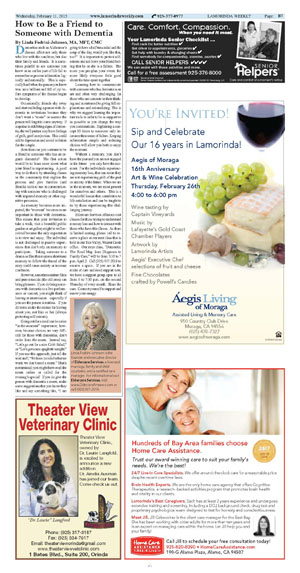|
|
Published February 11th, 2015
|
How to Be a Friend to Someone with Dementia
|
|
| By Linda Fodrini-Johnson, MA, MFT, CMC |
 |
| Linda Fodrini-Johnson is the founder and executive director of Eldercare Services, a licensed marriage, family and child counselor, and a certified care manager. For information about Eldercare Services, visit www.EldercareAnswers.com or call (925) 937-2018. |
Dementias such as Alzheimer's disease affect not only those who live with the condition, but also their family and friends. It is sometimes painful to see someone you knew at an earlier part of life fail to remember or process information logically and rationally. This is especially hard when the person you knew was once brilliant and full of joy before symptoms of the disease began to develop.
 Occasionally, friends shy away and start excluding a person with dementia in invitations because they don't want a "scene" or assume the person will forget to come anyway. If a spouse is exhibiting signs of dementia, the well partner may have feelings of guilt, grief or rejection. This could add to depression and social isolation for the couple.
Occasionally, friends shy away and start excluding a person with dementia in invitations because they don't want a "scene" or assume the person will forget to come anyway. If a spouse is exhibiting signs of dementia, the well partner may have feelings of guilt, grief or rejection. This could add to depression and social isolation for the couple.
 How then can you continue to be a friend to someone who has an organic dementia? The first action would be to learn more about what your friend is experiencing. A good way to do that is by attending classes in the community that explain the process and give families (and friends) tools to use in communicating with someone who is challenged with impaired memory or other cognitive processes.
How then can you continue to be a friend to someone who has an organic dementia? The first action would be to learn more about what your friend is experiencing. A good way to do that is by attending classes in the community that explain the process and give families (and friends) tools to use in communicating with someone who is challenged with impaired memory or other cognitive processes.
 As memory becomes more impaired, the "moment" becomes more important to those with dementias. This means that your invitation to take a walk, visit a beautiful public garden or art gallery might be well received because the only expectation is to view and enjoy. The individual is not challenged in passive experiences that don't rely on memory to participate. Taking someone to a drama or film that requires short term memory to follow the thread of the story could cause anxiety or increase confusion.
As memory becomes more impaired, the "moment" becomes more important to those with dementias. This means that your invitation to take a walk, visit a beautiful public garden or art gallery might be well received because the only expectation is to view and enjoy. The individual is not challenged in passive experiences that don't rely on memory to participate. Taking someone to a drama or film that requires short term memory to follow the thread of the story could cause anxiety or increase confusion.
 However, sometimes nature films and pure musicals (the old ones) can bring pleasure. If you do bring someone with dementia to a live performance or concert, you might think of leaving at intermission - especially if you see the person is restless. If you do leave, make the excuse for leaving about you, not him or her (always protecting self-esteem).
However, sometimes nature films and pure musicals (the old ones) can bring pleasure. If you do bring someone with dementia to a live performance or concert, you might think of leaving at intermission - especially if you see the person is restless. If you do leave, make the excuse for leaving about you, not him or her (always protecting self-esteem).
 Going out for a meal can be a nice "in-the-moment" experience; however, because choices are very difficult for those with dementias, don't order from the menu. Instead say, "Let's go out for a nice Cobb Salad," or "Let's get some spaghetti tonight." If you use this approach, just tell the wait staff, "We have decided what we want; we don't need a menu." That's not unusual; you might have read the menu online or called for the evening's special! If you do give the person with dementia a menu, make some suggestions that you know they like and say something like, "I am going to have a half tuna salad and the soup of the day, would you like that, too?" It is important to protect self-esteem and not leave your friend feeling that he or she is a failure. The more you pre-plan your event, the more likely everyone feels good about the time spent together.
Going out for a meal can be a nice "in-the-moment" experience; however, because choices are very difficult for those with dementias, don't order from the menu. Instead say, "Let's go out for a nice Cobb Salad," or "Let's get some spaghetti tonight." If you use this approach, just tell the wait staff, "We have decided what we want; we don't need a menu." That's not unusual; you might have read the menu online or called for the evening's special! If you do give the person with dementia a menu, make some suggestions that you know they like and say something like, "I am going to have a half tuna salad and the soup of the day, would you like that, too?" It is important to protect self-esteem and not leave your friend feeling that he or she is a failure. The more you pre-plan your event, the more likely everyone feels good about the time spent together.
 Learning how to communicate with someone who has dementia is an art and often very challenging for those who are concrete in their thinking and accustomed to giving full explanations and rationalizing. This is why we suggest learning the important tools in order to be as supportive as possible as you change the way you communicate. Explaining a concept 10 times to someone only increases their sense of failure. Keeping information simple and reducing choices will allow you both to enjoy the moment.
Learning how to communicate with someone who has dementia is an art and often very challenging for those who are concrete in their thinking and accustomed to giving full explanations and rationalizing. This is why we suggest learning the important tools in order to be as supportive as possible as you change the way you communicate. Explaining a concept 10 times to someone only increases their sense of failure. Keeping information simple and reducing choices will allow you both to enjoy the moment.
 Without a memory, you don't have the past and you are not engaged in the future - you only have the moment. For the individuals experiencing memory loss, that can mean they are not experiencing guilt of the past or anxiety of the future. When we are in the moment, we are most present for ourselves and others. This is a wonderful lesson that contributes to life satisfaction and can be taught to us by those experiencing this challenging journey.
Without a memory, you don't have the past and you are not engaged in the future - you only have the moment. For the individuals experiencing memory loss, that can mean they are not experiencing guilt of the past or anxiety of the future. When we are in the moment, we are most present for ourselves and others. This is a wonderful lesson that contributes to life satisfaction and can be taught to us by those experiencing this challenging journey.
 Eldercare Services offers no-cost classes for those trying to understand memory loss and how to interact with those who have this illness. As there is limited seating, please call to reserve a place at our next class that is held in our Tice Valley, Walnut Creek office. Our next class, "Dementia: The Road Map from Diagnosis to Family Care," will be from 5:30 to 7 p.m. April 2. Call (925) 937-2018 to reserve a space. If you are in the midst of care and need support now, we have a support group open to all from 6 to 7:30 p.m. on the second Thursday of every month. Share the care. Connect yourself to support and renew your energy.
Eldercare Services offers no-cost classes for those trying to understand memory loss and how to interact with those who have this illness. As there is limited seating, please call to reserve a place at our next class that is held in our Tice Valley, Walnut Creek office. Our next class, "Dementia: The Road Map from Diagnosis to Family Care," will be from 5:30 to 7 p.m. April 2. Call (925) 937-2018 to reserve a space. If you are in the midst of care and need support now, we have a support group open to all from 6 to 7:30 p.m. on the second Thursday of every month. Share the care. Connect yourself to support and renew your energy.


|
|
|
|
|
|
|
|
|
| |
|
|
|
|



